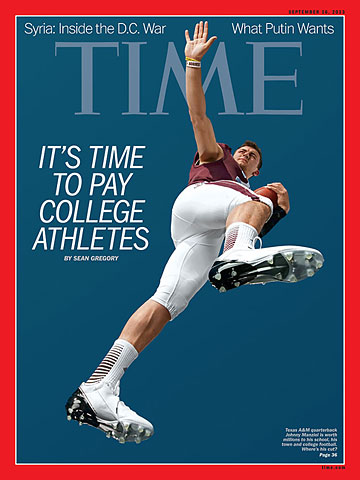
(7 of 7)
Most important, player payments would force schools to operate in an environment in which they're honest with themselves. Sports are a big business, and we value the exposure and revenue that it brings to our schools. But let's stop saying one thing--"we care for our student-athletes"--while doing another: preventing them from benefiting monetarily. "Living a lie," says Richard Southall, director of the College Sport Research Institute at the University of South Carolina, "is hard to do."
Within higher ed, there's clearly momentum to give athletes at least a little more than what they're getting now. "I think there is change likely on the horizon," says Nebraska chancellor Harvey Perlman, who is chairman of the Bowl Championship Series oversight committee. The NCAA membership has stalled a plan giving schools the option to offer a $2,000 stipend to cover expenses beyond tuition, room and board, books and fees. Many schools at the lower levels of Division 1 said they couldn't afford it.
But at this point, the power football conferences seem determined to offer at least some kind of extra. "I think we will find a way to provide all scholarship student-athletes with the full cost-of-attendance scholarship," says Perlman. As for anything above that, don't expect radical change, but universities' leaders are at least discussing it. "I don't think there's any doubt about that," says Martin, the Colorado State chancellor who was recently chancellor at LSU. "With the O'Bannon thing hanging out there, we're going to see a great deal more of a conversation about this than we've had before. Because we have to fix it one way or another."
Athletes are starting to speak up too. Chris Brunette, an offensive lineman from the University of Georgia, is pursuing an MBA during his final year of athletic eligibility. Though his pro prospects are strong, Brunette knows he can suffer a career-ending injury at any point. "The NFL is not promised at all," says Brunette. "For so many college athletes, at no other time in our lives will we be as valuable. To be able to capitalize on that would be great."
When he first arrived on campus in 2009, Brunette says, "I thought a scholarship was more than enough." During his freshman and sophomore years, Brunette opened a business on the side giving $5 haircuts to his teammates to help pay expenses. (Brunette checked with the NCAA compliance officer before launching his dorm-room barbershop, just to be on the safe side.) Georgia football--which started the season ranked fifth in the country--generates $75 million in annual revenues.
"I don't want to seem like a troublemaker or greedy," he says. "We're marketing tools for the programs but can't see the proceeds. In this country, it just seems backwards."
The U.S. has enjoyed a long, deep love affair with college sports. It's about time we finally paid for it.
